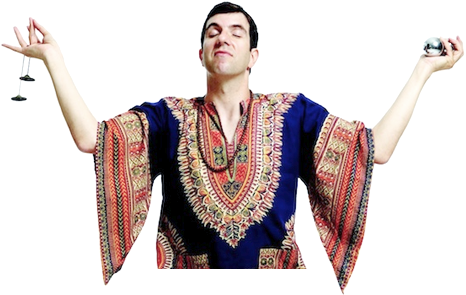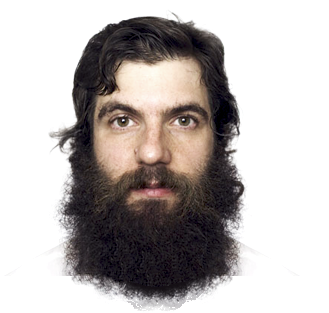Excerpt
INTRODUCTION
As I write this, I have a beard that makes me resemble Moses. Or Abe Lincoln. Or Ted Kaczynski. I’ve been called all three.
It’s not a well-manicured, socially-acceptable beard. It’s an untamed mass that creeps up toward my eyeballs and drapes below my neckline.
I’ve never allowed my facial hair to grow before, and it’s been an odd and enlightening experience. I’ve been inducted into a secret fraternity of bearded guys – we nod at each other as we pass on the street, giving a knowing quarter-smile. Strangers have come up to me and petted my beard, like it’s a Labrador Retriever puppy or a pregnant woman’s stomach.
I’ve suffered for my beard. It’s been caught in jacket zippers and been tugged on by my surprisingly strong two-year-old son. I’ve spent a lot of time answering questions at airport security.
I’ve been asked if I’m named Smith and sell cough drops with my brother. ZZ Top is mentioned at least three times a week. Passersby have shouted “Yo, Gandalf.” Someone called me Steven Seagal, which I found curious, since he doesn’t have a beard.
I’ve battled itch and heat. I’ve spent a week’s salary on balms, powders, ointments and conditioners. My beard has been a temporary home to cappuccino foam and lentil soup. And it’s upset people. Thus far, two little girls have burst into tears and one boy has hidden behind his mother.
But I mean no harm. The facial hair is simply the most noticeable physical manifestation of a spiritual journey I began a year ago.
My quest has been this: To live the ultimate Biblical life. Or more precisely, to follow the Bible as literally as possible. To obey the Ten Commandments. To be fruitful and multiply. To love my neighbor. To tithe my income. But also to abide by the oft-neglected rules: To avoid wearing clothes made of mixed fibers. To stone adulterers. And, naturally, to leave the edges of my beard unshaven (Leviticus 19:27). I am trying to obey the entire Bible, without picking and choosing.
To back up: I grew up in an extremely secular home in New York City. I am officially Jewish, but I’m Jewish in the same way the Olive Garden is an Italian restaurant. Which is to say: Not very. I attended no Hebrew school, ate no matzoh. The closest my family came to observing Judaism was that paradoxical classic of assimilation: a Star of David on top of our Christmas tree.
It’s not that my parents badmouthed religion. It’s just that religion wasn’t for us. We lived in the 20th century, for crying out loud. In our house, spirituality was almost a taboo subject, much like my father’s salary or my sister’s clove cigarette habit.
My only brushes with the Bible were brief and superficial. We had a next-door neighbor, Reverend Schulze, a kindly Lutheran minister who looked remarkably like Thomas Jefferson. (By the way, Reverend Schulze’s son became an actor and, oddly enough, went on to play the part of the creepy priest on The Sopranos.) Reverend Schulze told great stories about college sit-ins during the sixties, but whenever he started talking about God, it just sounded like a foreign language to me.
I attended a handful of bar mitzvahs where I zoned out during services and spent the time trying to guess who had bald spots under their yarmulkes. I went to my paternal grandfather’s funeral, which was, to my surprise, presided over by a rabbi. How could the rabbi eulogize a man he’d never met? It was disconcerting.
And as far as childhood religion, that was about it.
I was agnostic before I even knew what the word meant. Partly, it was the problem of the existence of evil. If there is a God, why would He allow war, disease, and my fourth-grade teacher Ms. Barker, who forced us to have a sugar-free bake sale? But mostly, the idea of God seemed superfluous. Why do we need an invisible, inaudible deity? Maybe He exists, but we’ll never know in this life.
College didn’t help my spiritual development. I went to a secular university where you were more likely to study the semiotics of Wicca rituals than the Judeo-Christian tradition. And when we did read the Bible, it was as literature, as a fusty ancient book with the same truth quotient as The Faerie Queene.
We did, of course, study the history of religion. How the Bible has been the force behind many of humankind’s greatest achievements: the civil rights movement, charitable giving, the abolition of slavery. And how, of course, it’s been used to justify our worst: war, genocide and the subjugation of others.
For a long time, I thought that religion, for all the good it does, seemed too risky for our modern world. The potential for abuse too high. I figured it would slowly fade away like other archaic things. Science was on the march. Someday soon we’d all be living in a neo-Enlightenment paradise where every decision was made with steely, Spock-like logic.
As you might have noticed, I was spectacularly mistaken. The influence of the Bible — and religion as a whole – remains a mighty force, perhaps even stronger than it was when I was a kid. So in the last few years, religion has become my fixation. Is half of the world suffering from a massive delusion? Or is my blindness to spirituality a huge defect in my personality? What if I’m missing out on part of being human, like a guy who goes through life without ever hearing Beethoven or falling in love? And most important, I now have a young son – if my lack of religion is a flaw, I don’t want to pass it onto him.
So I knew I wanted to explore religion. I just needed to figure out how.
The germ of the idea came from my own family: My uncle Gil. Or ex-uncle, to be exact. Gil married my aunt and divorced her a few years later, but he remains the most controversial member of our family. If the rest my relatives are ultra-secular, Gil makes up for it by being, quite possibly, the most religious man in the world. He’s a spiritual omnivore. He started his life as a Jew, became a Hindu, appointed himself a guru, sat for eight months on a Manhattan park bench without speaking, founded a hippie cult in upstate New York, turned into a born-again Christian, and, in his latest incarnation, is an ultra-Orthodox Jew in Jerusalem. I may have missed a phase – I think he was into Shinto for a bit. But you get the idea.
At some point along his spiritual path, Gil decided to take the Bible literally. Completely literally. The Bible says to bind money to your hand (Deuteronomy 14:25), so Gil withdrew $300 from the bank and tied the bills to his palm with a thread. The Bible says to wear fringes on the corners of your garment (Numbers 16:38), so Gil bought yarn from a knitting shop, made a bunch of tassels and attached them to his shirt collar and the ends of his sleeves. The Bible says to give money to widows and orphans, so he walked the streets asking people if they were widows or orphans so he could hand them cash.
About a year and a half ago, I was telling my friend Paul about Gil’s bizarre life over lunch at a sandwich shop, and I had my epiphany. That’s it. I needed to follow the Bible literally myself. I needed to do it for several reasons.
First, since the Bible requires me to tell the truth (Proverbs 26:28), I must confess that part of the reason is to write this book. A couple of years ago, I came out with a book about reading theEncyclopaedia Britannica, all of it, from A to Z – or more specifically, from a-ak (East Asian music) to Zywiec (a town in southern Poland known for its beer). What could I do next? The only intellectual adventure that seemed a worthy follow-up was to explore the most influential book in the world, the all-time bestseller, the Bible.
Second, this project would be my visa to a spiritual world. I wouldn’t just be studying religion. I’d be living it. If I have what they call a God-shaped hole in my heart, this quest will allow me fill it. If I have a hidden mystical side, this year will bring it out of the closet. If I want to understand my forefathers, this year will let me live like they did, but with less leprosy.
And third, this project would be a way to explore the huge and fascinating topic of Biblical literalism. Millions of Americans say they take the Bible literally. According to a 2005 Gallup poll, the number hovers near 33 percent. A Newsweek poll puts it at 55 percent. A literal interpretation of the Bible – both Jewish and Christian — shapes American policies on the Middle East, homosexuality, stem cell research, education, abortion – right on down to rules about buying beer on Sunday.
But my suspicion was that almost everyone’s literalism consisted of picking and choosing. People plucked out the parts that fit their agenda, whether that agenda was to the right or left. Not me. I thought, with some naiveté, I would peel away the layers of interpretation and find the true Bible underneath. I would do this by being the ultimate fundamentalist. I’d be fearless. I would do exactly what the Bible said, and in so doing, I’d discover what’s great and timeless in the Bible and what is outdated.
I told my wife, Julie, my idea, and warned her it might affect our life in a not-so-minor way. She didn’t gnash her teeth or tear out her hair. She just emitted a little sigh. “I was kind of hoping your next book would be a biography of Eleanor Roosevelt or something.”
Everyone – family, friends, co-workers – had the same concern: That I’d go native. That I’d end up as a beekeeper at a monastery or I’d move into my ex-uncle Gil’s spare room in his Jerusalem apartment.
In a sense, they were right to worry. You can’t immerse yourself in religion for 12 months and emerge unaffected. At least I couldn’t. Put it this way: If my former self and my current self met for coffee, they’d get along okay, but they’d both probably walk out of the Starbucks shaking their heads and saying to themselves, “That guy is kinda delusional.”
As with most Biblical journeys, my year has taken me on detours I could never have predicted. I didn’t expect to herd sheep in Israel. Or fondle a pigeon egg. Or find solace in prayer. Or hear Amish jokes from the Amish. I didn’t expect to confront just how absurdly flawed I am. I didn’t expect to discover such strangeness in the Bible. And I didn’t expect to, as the Psalmist says, Take refuge in the Bible and rejoice in it.
SAMPLE CHAPTER
They shall be stoned with stones, their blood shall be upon them
Leviticus 20:27
Day 64. It’s been more than a month since my mixed fiber adventure. Time for me to tackle the second item on my list of Most Perplexing Laws. Capital Punishment.
The Hebrew scriptures prescribe a tremendous amount of capital punishment. Think Saudi Arabia, multiply by Texas, then triple that. It wasn’t just for murder. You could also be executed for adultery, blasphemy, breaking the Sabbath, perjury, incest, bestiality and witchcraft, among others. A rebellious son could be sentenced to death. As could a gluttonous or a drunkardly son.
The most commonly mentioned punishment method in the Hebrew Bible is stoning. So I figure, at the very least, I should try to stone. But how?
I can’t tell you how many people have suggested I get adulterers and blasphemers stoned in the cannabis sense. Which is an interesting idea. But I haven’t smoked pot since I was at Brown University and I wrote a paper for my anthropology class on the hidden symbolism of bong hits. (Brown was the type of college where this paper actually earned a B+).
Instead, I figured my loophole would be this: the bible doesn’t specify the size of the stones. So…pebbles.
A few days ago, I gathered a handful of small white pebbles from Central Park, which I stuffed in my back pants pocket. Now all I needed were some victims. I decide to start with Sabbath breakers. That’s easy enough to find in this workaholic city. I noticed a pot-bellied guy at the Avis down our block had worked on both Saturday and Sunday. So no matter what, he’s a Sabbath-breaker.
Here’s the thing, though: Even with pebbles, it is surprisingly hard to stone people.
My plan had been to walk nonchalantly past him and chuck the pebbles at the small of his back. But after a couple of failed passes, I realized it was a bad idea. A chucked pebble, no matter how small, does not go unnoticed.
My revised plan: I would pretend to be clumsy and drop the pebble on his shoe. So I did.
And in this way I stoned. But it was probably the most polite stoning in history – I said ‘I’m sorry,’ and then leaned down to pick up the pebble. And he leaned down at the same time, and we almost butted heads, and then he apologized, then I apologized again.
Highly unsatisfying.
Today, I get another chance. I am resting in a small public park on the Upper West Side, the kind where you see retirees eating tuna sandwiches on benches.
“Hey, you’re dressed queer.”
I look over. The speaker is an elderly man, mid-70s I’d guess. He is tall and thin and is wearing of those caps that cabbies wore in movies from the Forties.
“You’re dressed queer,” he snarls. “Why you dressed so queer.” I have on my usual fringes, and, for good measure, have worn some sandals and am carrying a knotty maple walking stick I’d bought on the Internet for $25.
“I’m trying to live by the rules of the Bible. The 10 commandments, stoning adulterers…”
“You’re stoning adulterers?”
“Yeah, I’m stoning adulterers.”
“I’m an adulterer.”
“You’re currently an adulterer?”
“Yeah. Tonight, tomorrow, yesterday, two weeks from now. You gonna stone me?”
“If I could, yes, that’d be great.”
“I’ll punch you in the face. I’ll send you to the cemetery.”
He is serious. This isn’t a cutesy grumpy old man. This is an angry old man. This is a man with seven decades of hostility behind him.
I fish out my pebbles from my back pocket.
“I wouldn’t stone you with big stones,” I say. “Just these little guys.”
I open my palm to show him the pebbles. He lunges at me, grabbing one out of my hand, then chucking it at my face. It whizzes by my cheek.
I am stunned for a second. I hadn’t expected this elderly man to make the first move. But now there is nothing stopping me from retaliating. An eye for an eye.
I take one of the remaining pebbles and whip it at his chest. It bounces off.
“I’ll punch you right in the kisser,” he say.
“Well, you really shouldn’t commit adultery,” I say.
We stare at each other. My heart is racing.
Yes, he is a septuagenarian. Yes, he had just threatened me using corny Honeymooners dialogue. But you could tell: This man has a strong dark side.
Our glaring contest lasts ten seconds, then he walks away, brushing by me as he leaves.
When I was a kid, I saw an episode of All in the Family in which Meathead — Rob Reiner’s wussy peacenik character — socked some guy in the jaw. Meathead was very upset about this. But he wasn’t upset that he committed violence; he was upset because it felt so good to commit violence.
I can relate. Even though mine was a Stoning Lite, barely fulfilling the letter of the law, I can’t deny: It felt good to chuck a rock at this nasty old man. It felt primal. It felt like I was getting vengeance on him. This guy wasn’t just an adulterer, he was a bully. I wanted him to feel the pain he’d inflicted on others, even if that pain was a tap on the chest.
Like Meathead, I also knew that this was a morally stunted way to feel. Stoning is about as indefensible as you can get. It comes back to the old question: How can the Bible be so wise in some places and so barbaric in others? And why should we put any faith in a book that includes such brutality? Later that week, I ask my spiritual adviser Yossi about stoning. Yossi was born in the Midwest, and calls himself a “Jewtheran” – Jewish guilt and Lutheran repression mesh nicely, he told me. He’s an ordained Orthodox rabbi, but never practiced, instead opting for the shmatta trade – he sold scarves to, among others, the Amish. He’s tall and broad-shouldered with a neatly-trimmed beard. In his spare time, writes wry essays about Jewish life, including a lament about how his favorite snack, Twinkies, recently became non-kosher. I met him through Aish HaTorah, an Orthodox outreach group. He isn’t fazed by my question at all.
We don’t stone people today because you need a Biblical theocracy to enforce the stoning. No such society exists today. But even in ancient times, stoning wasn’t barbaric.
“First of all, you didn’t just heave stones,” says Yossi. “The idea was to minimize the suffering. What we call ‘stoning’ was actually pushing the person off the cliff so they would die immediately upon impact. The Talmud actually has specifications on how high the cliff must be. Also, the person getting executed was given strong drink to dull the pain.”
Plus, the stonings were a rare thing. Some rabbis say executions only occurred once every seven years, others say even less often. There had to be two witnesses to the crime. And the adulterer had to be tried by a council of 70 elders. And weirdly, the verdict of those 70 elders could not be unanimous– that might be a sign of corruption or brainwashing. And so on.
I half-expected Yossi to say they gave the adulterer a massage and a gift bag. He made a compelling case. And yet, I’m not totally sold. Were ancient times really so merciful? I suspect there might be some whitewashing going on. As my year progresses, I’ll need to delve deeper.



